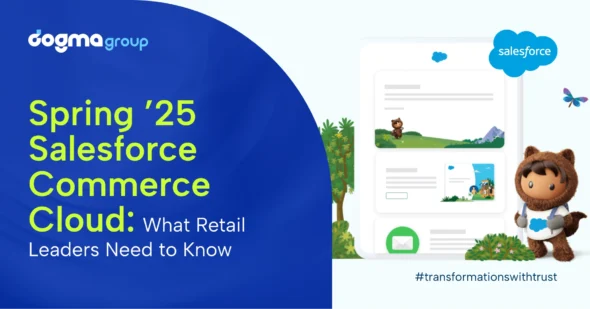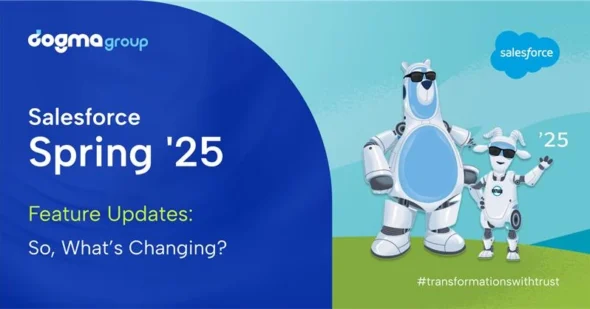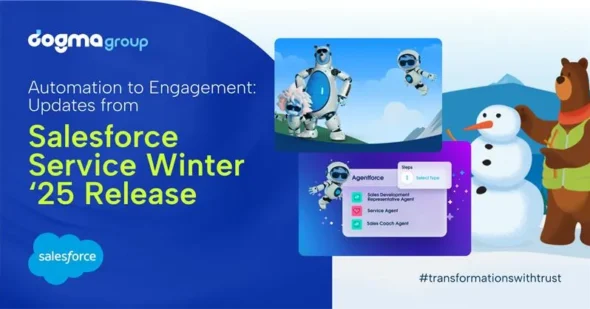The report you’ve been waiting for is here and it brings you the hard truth: AI is no longer a novelty but a necessity. That’s right! The 2024 Work Trend Index Annual Report from Microsoft and LinkedIn reveals that employees aren’t just embracing AI; they’re racing ahead with it! But here’s the kicker: employees aren’t waiting for their organisations to catch up—they’re bringing their own AI to the table.
Meanwhile, many leaders are stuck in neutral, lacking a clear plan to fully integrate AI into business operations. It’s the classic case of knowing the destination but struggling to plot the course. But waiting for a guaranteed ROI on AI is like waiting for the internet to catch on – it’s happening, and early adopters win.
The good news? AI isn’t here to steal jobs. In fact, a talent shortage looms! Leaders are scrambling to fill crucial roles, while employees eye career advancements powered by AI prowess rather than mere experience. It’s a seismic shift that is fast reshaping the workplace, where AI fluency becomes the new gold standard.
So, how do you navigate this rise of AI at work as leaders and leverage it for business success? The 2024 Work Trend Index Annual Report addresses the inertia surrounding adoption of AI at work and helps you transition from the AI Stone Age. Here are the key findings that it highlights:
1. AI at Work: Your Employees are Already in It! (Are You?)
The AI revolution is quietly sweeping workplaces, and it’s boosting productivity and creativity—the report shows. A whopping 75% of knowledge workers now leverage AI, with 46% adopting it within the past six months. And the results are undeniable:
- 90% reported time savings,
- 85% gained better focus on their priorities,
- 84% became more creative, and
- 83% enjoyed their work more.
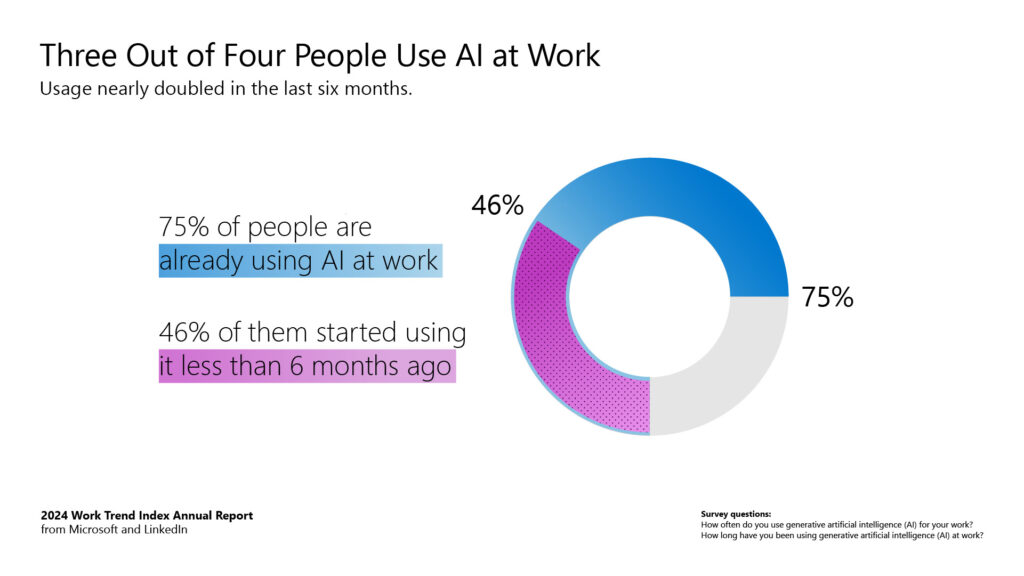
For power users, the impact is even more dramatic. Top 5% Teams users, for instance, saved a full workday in March by summarising meetings with AI.
AI at Work: A Balancing Act for Leaders
The report also indicates that organisational leaders overwhelmingly recognise AI’s competitive edge: a staggering 79% agree their company must adopt AI to stay ahead. Yet, a significant barrier exists quantifying the return on investment (ROI) of AI. Nearly 60% of leaders express concern about measuring the productivity gains AI brings. This uncertainty creates a roadblock to progress – 6 out of 10 leaders worry their organisation lacks a clear plan and vision for AI implementation.
But employees are not waiting for the green light, they are already taking AI adoption into their own hands, with 78% resorting to “Bring Your Own AI (BYOAI)” tools. This trend is particularly prevalent in smaller companies (80%) and cuts across all generations, not just Gen Z.
However, this enthusiasm comes with hidden risks.
- Fear of Job Replacement: Over half (52%) of AI users hesitate to disclose its use on critical tasks while 53% fear it makes them seem expendable.
- Cybersecurity Concerns: This shadow AI approach undermines strategic AI implementation and jeopardises company data security – a major concern considering leaders rank cybersecurity as their top priority for 2024 and ahead.
The BYOAI Trend: What Drives AI at Work
The pressure is on, and employees are struggling to keep their heads above water. A staggering 68% report feeling overwhelmed by the sheer volume and pace of work, with 46% teetering on burnout.
The culprit is information overload! Despite 85% of emails being skimmed in under 15 seconds, the average worker reads 4 emails for every 1 they send. Meetings and late nights also remain common post-pandemic, and communication dominates the workday. In Microsoft 365, there’s a stark imbalance. Users typically spend 60% of their time on emails, chats, and meetings, leaving only 40% for creative tasks in Word and PowerPoint.
However, forward-thinking leaders are witnessing a revolution. Those “extremely familiar” with AI liken its impact to the shift from typewriter to computer—a massive leap. Within five years, 41% predict a complete overhaul of business processes driven by AI. And this vision extends beyond simple adoption. These leaders anticipate the rise of new responsibilities: orchestrating AI implementation (38%), training AI bots (42%), and ensuring ethical AI use (47%).
The data speaks for itself! Employees crave AI to fight information overload. Leaders can only embrace it to empower employees with sanctioned tools, boosting morale and innovation. This isn’t a fight, it’s a wave to ride. Invest in AI to solve employee pain points, unlock business benefits, and go beyond just ROI.
2. AI Empowers Employees, Leading to Career Advancement
AI is no longer just a potential disruptor; it’s a career game-changer. While job loss is a concern (45%), the data reveals a hidden truth: there’s a talent shortage (55% of leaders worry about filling roles) across functions, especially in cybersecurity, engineering, and creative design (60%+).
Employees also seem to be ready with a record 46% considering a career change and job applications per role surging 14% since last fall according to LinkedIn. And 85% of professionals are open to new opportunities, presenting a massive talent pool.
So, here’s the opportunity. Forget fearing AI and embrace reskilling and unlock the potential of a future-proof workforce. Upskilling in AI empowers employees to raise the bar and break career ceilings, leading to a more competitive and innovative organisation.
AI Skills: The New Currency for Every Hire
Thanks to increasing use of AI at work, the talent landscape is also undergoing a seismic shift. After a surge in technical AI hiring—up 323% in eight years, leaders are now prioritising a different skillset: AI aptitude. This encompasses the ability to utilise user-friendly AI tools like ChatGPT and Copilot.
The demand seems undeniable:
- 66% of leaders wouldn’t hire someone without AI skills.
- 71% would choose a less experienced candidate with AI skills over a highly experienced one without.
- 77% of leaders anticipate AI empowering early-career professionals with greater responsibilities.
The message is loud and clear! AI fluency isn’t just for tech wizards anymore. It’s rapidly becoming the new essential skill across all roles. This opens doors for ambitious individuals and fundamentally reshapes the future of work.
The AI Skills Gap: Why Upskilling Your Workforce Trumps Hiring A new
As leaders get laser-focused on finding new talent with AI expertise, many are neglecting the potential of upskilling their existing workforce in AI. Here’s why investing in your people is the smarter play:
- Untapped Potential: A staggering 45% of US executives aren’t equipping their employees with AI tools – hindering their ability to leverage this powerful technology.
- Training Deficit: Globally, only 39% of those using AI at work received company-provided training. This lack of internal upskilling creates a knowledge gap that hinders productivity.
- Futureproofing Your Workforce: Just 25% of companies plan to offer training on generative AI this year. This shortsighted approach leaves them unprepared for the future of work.
The new imperative is, thus, upskilling, not just hiring. Developing your current talent pool with AI aptitude is a strategic advantage. By investing in their growth, you unlock their potential to utilise AI effectively, propelling your organisation forward.
The AI Skills Boom: Professionals Take Charge
While that might take some time, professionals aren’t waiting any longer. They are taking matters into their own hands! A staggering 76% recognise the need for AI skills to stay competitive, with 69% believing AI can accelerate promotions, and 79% confident it will expand job opportunities.
This proactive approach is evident in a 160% surge in LinkedIn Learning courses focused on AI aptitude among non-technical professionals in just six months. Project managers, architects, and even administrative assistants are actively upskilling.
The trend isn’t limited to traditional learning methods. A 142x increase in LinkedIn members globally adding AI skills like ChatGPT and Copilot to their profiles shows a surge in self-directed learning. Writers, designers, and marketers unsurprisingly lead the charge, with good reason. B2B marketers see generative AI as a key tool, with 55% planning to use it for increased efficiency and 51% for creating impactful content.
Perhaps the most surprising finding is the industry breakdown. Administrative and support services, real estate, and retail—not just the tech sector— are embracing AI skills, demonstrating its widespread applicability across diverse job functions.
The Future of AI at Work: Transformation, Not Replacement
Fears of AI replacing entire job markets dominate headlines, but the reality is far more nuanced. For most individuals, AI won’t eliminate their jobs—it will fundamentally transform them. This evolution will likely lead to entirely new roles currently unseen on the professional horizon.
The evidence hints at a dramatic shift underway. The 2024 Work Trend Index Annual Report predicts that by 2030, 50% of essential job skills will be different from those required in 2016. Generative AI, a powerful form of artificial intelligence, is expected to accelerate this transformation, pushing that figure to an even higher to 68%.
Furthermore, the job titles, too, are undergoing a rapid evolution. Over two-thirds (68%) of the fastest-growing roles in the US, as identified by LinkedIn’s Jobs on the Rise report, are positions that didn’t even exist two decades ago. This underscores the dynamic nature of the modern workforce and the need for continuous skill development.
Companies are actively preparing for this AI-driven world. Recruiters report a 12% increase in creating new roles specifically focused on utilising generative AI. This trend is further exemplified by the explosive growth of the “Head of AI” position. Over the past five years, this role has tripled, and 2023 alone saw a 28% increase.
These interesting findings clearly mean the future of work demands adaptability and a willingness to embrace AI as a transformative tool. While specific tasks may change, the opportunities for growth and innovation are immense.
The AI Advantage: How Offering AI Access Attracts Top Talent
In today’s competitive talent market, companies are constantly seeking new ways to attract and retain top performers. One increasingly effective strategy could be offering access to AI tools.
Here’s why AI is fast becoming a talent magnet:
- Demand is Skyrocketing: Job postings mentioning AI have seen a surge in applications—17% higher in the past two years compared to non-AI postings.This highlights the growing interest among job seekers in working with these powerful technologies.
- Future Workforce Prioritises AI: Studies reveal that 54% of early-career professionals—the future of the workforce— consider access to AI a key factor when choosing an employer. This generation recognises the potential of AI to enhance their skills and accelerate their careers.
- AI Skills Signal Innovation: Recruiters are taking notice. A significant 22% are already revamping job descriptions to emphasise the use of generative AI in specific roles. This shift underscores AI’s growing importance across industries.
The benefits of AI extend far beyond attracting talent. As AI takes over repetitive tasks, employees at all levels will have the chance to focus on more strategic initiatives. This shift will elevate the importance of uniquely human skills like management, relationship building, negotiation, and critical thinking.
Leading by example, even pioneering organisations like JPMorgan Chase, Procter & Gamble, and AT&T, all recognised as LinkedIn Top Companies, are already equipping their teams with AI learning opportunities. This proactive approach positions them as leaders in the AI-powered future of work.
3. The Future of AI at Work: Insights from Growing AI Power Users
This research also reveals a fascinating spectrum of AI users, with power users emerging as a distinct and highly productive group. This diverse landscape offers valuable insights into the future of work.
The study identifies four main categories:
- Sceptics: Users hesitant or unfamiliar with AI, using it infrequently if at all- saving 10 minutes or less per day
- Novices: Users using AI only a few times a month and seeing daily time savings (30 minutes or less)
- Explorers: Users utilising AI once a week and experiencing modest daily time savings (between 5 and 30 minutes per day)
- Power users: Users actively integrating AI into their workflows several times per week (saves more than 30 minutes per day)
The Power User Advantage: How AI Transforms Work and Well-Being
The benefits of AI at work extend far beyond mere efficiency. Power users report a remarkable transformation in their work experience. A staggering 92% say AI helps them manage overwhelming workloads, while the same percentage feels both more creative and focused on what truly matters. This translates to a more motivated (91%) and enjoyable (91%) work environment.
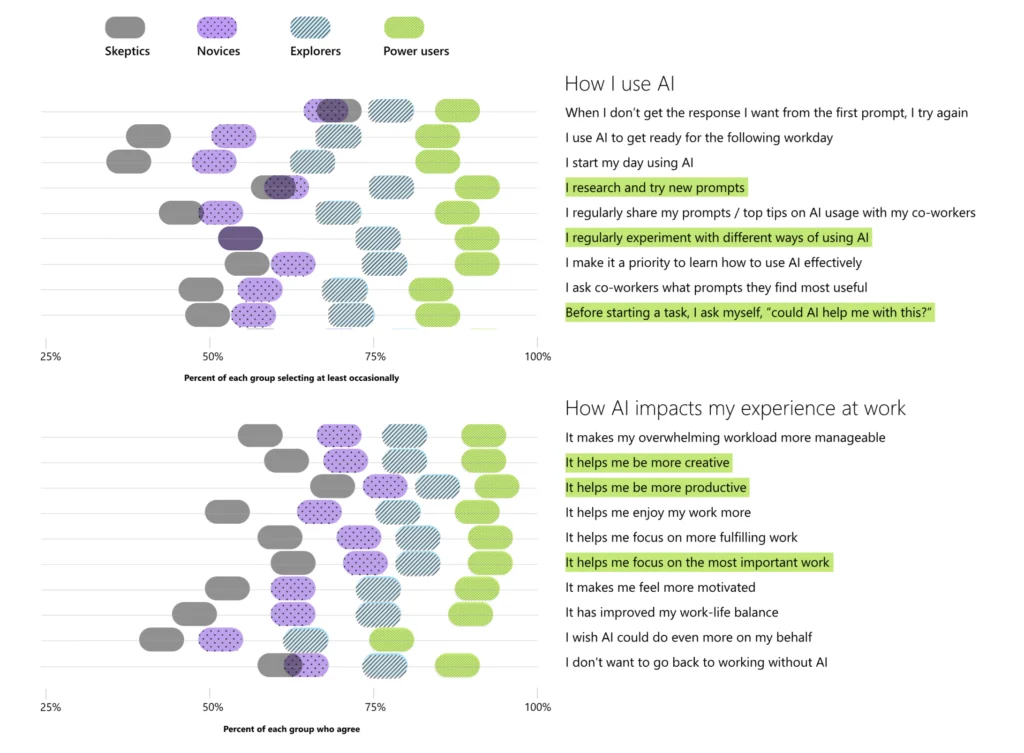
So, what sets power users apart? It all boils down to a specific set of habits. The most significant factor is experimentation. Power users are:
- 68% more likely to constantly explore new ways to leverage AI, actively experimenting better methods to integrate it into their workflow.
- +49% more likely to pause and consider AI’s potential before tackling a task, and
- +30% more likely to persist when they don’t achieve perfect results on the first try.
Their commitment is further evidenced by a +56% increase in researching and trying new prompts to unlock AI’s full potential. Interestingly, power users also tend to “bookend” their day with AI, utilising it both at the start (85%) and to prepare for the next workday (85%).
This isn’t just about individual tasks, either. Power users have fundamentally transformed their work patterns. They are significantly more likely to leverage AI for activities like catching up on meetings (56%), data analysis (+51%), visual content creation (+49%), customer interaction (+49%), and even brainstorming (37%). Most impressively, they’re already pushing the boundaries, with a 66% higher chance of redesigning entire business processes and workflows around AI.
The surge of power users points to AI’s transformative potential. By embracing experimentation, continuous learning, and a willingness to reimagine work itself, other users can also discover a more efficient, productive, and ultimately, more enjoyable work experience. Plus, as AI becomes more accessible and user-friendly, we can expect a shift towards a more AI-integrated workforce.
How Organisations Can Fuel AI Success
The research also reveals a critical factor beyond individual habits: the role of the organisation itself. Companies that foster a supportive environment are key to empowering AI power users.
Here’s what sets them apart:
- Leadership Buy-In: Power users are significantly more likely to be exposed to strong leadership messages around AI. They are 61% more likely to hear their CEO emphasise the importance of generative AI and experience a higher level of advocacy from both departmental leaders (40%) and their manager’s manager (42%). This clear commitment from the top sends a powerful message about AI integration as a company priority.
- Culture of Change: Successful AI adoption often hinges on a company culture that embraces change. Power users are 53% more likely to report feeling encouraged by leadership to explore how AI can transform their specific function. Additionally, they are 18% more likely to feel their company fosters a culture of innovation, a crucial mindset for harnessing the full potential of AI.
- Targeted Training: Organisations that invest in targeted training programs see higher rates of AI adoption. Power users are 37% more likely to work for companies with virtual learning platforms offering AI-focused training. This focus on practical skills extends to specific training in prompt writing (+37%), role-specific AI applications (+35%), and even training on data analysis and content creation using AI (+32%).
These figures reflect the powerful synergy between a skilled and adaptable workforce and an organisation that actively fosters learning, experimentation, and a culture of change. When these elements come together, AI becomes the catalyst for a truly transformative work experience.
Copilot Study: Reshaping Your Workday
Imagine a workday with less email, more focused meetings, and increased time for high-value tasks. This is the potential future revealed by a Microsoft study on AI assistants. The Copilot Study, the first large-scale observation of its kind, tracked 3,000 individuals using AI assistants in their natural work environments over six months across 60 Copilot customers.
Here’s what researchers discovered:
- Taming the Inbox: Overall, Copilot users grappled with 11% fewer emails and spent 4% less time interacting with them. Notably, some users saw an even greater impact, with a 25% to 45% reduction in email time. This suggests AI assistants can significantly reduce the time we spend on email overload.
- Meetings Redefined: The study found a fascinating trend with meetings. While some companies saw a decrease in meeting time, others actually experienced an increase. This seemingly contradictory finding points to a potential shift in meeting purpose. Researchers believe AI might be making meetings more valuable – transforming them into efficient information hubs and brainstorming sessions that can quickly translate ideas into actionable drafts. This increased efficiency could lead to fewer, more focused meetings in some cases, while in others, the value gained might necessitate more frequent interaction. As AI capabilities continue to evolve, researchers anticipate this trend to further solidify – allowing us to streamline some meetings while maximising the effectiveness of others.
- Focus on What Matters: The study also revealed a 10% increase in document editing across Word, Excel, and PowerPoint for Copilot users. Companies experiencing the biggest impact saw this figure jump to 20%. This suggests that the time saved on emails and potentially streamlined meetings is being redirected towards more strategic activities like creating and analysing information.
The AI Roadmap for Business Transformation
The tide is turning. Employee enthusiasm for AI presents a golden opportunity for leaders to drive real business transformation. While the specific path will vary for each organisation, here’s a roadmap to get started:
1. Target a Problem, Apply AI:
Efficiency gains are waiting to be unlocked across every function. The key is to identify a specific process ripe for AI integration. Start by zeroing in on a problem area – perhaps it’s improving customer service call-handling times. Leading companies across industries are already paving the way. Global advertising network dentsu is harnessing AI for creative development, while Estée Lauder leverages it to reimagine product development and customer experience.
2. Aligning Top and Bottom:
Scaling AI from experimentation to full-fledged transformation requires buy-in at all levels. Engage everyone, from the CEO to entry-level employees. Business gains will materialise as your business line leaders champion AI and activate teams to embrace its potential. Microsoft’s own Copilot rollout serves as a prime example – their success hinged on internal champions strategically placed throughout the organisation, modelling and spreading AI enthusiasm and skills.
3. Invest in Training:
AI power users don’t operate in a vacuum. They thrive on ongoing training, encompassing both universal AI skills and those tailored to their specific roles. Platforms like LinkedIn Learning offer a launching pad for skill development, while resources like the Copilot Scenario Library provide targeted use cases for various positions and functions.
Lastly
We stand at a critical juncture for AI in the workplace. AI is demonstrably enhancing creativity, productivity, and job seeker competitiveness. Over time, it will reshape every facet of professional life. Companies that actively embrace the challenge of transforming experimentation into tangible business impact will surge ahead. But the path can be tricky. To seize this moment early and reap unprecedented rewards with strategic AI implementation in your organisation, get in touch with Dogma’s experts.


